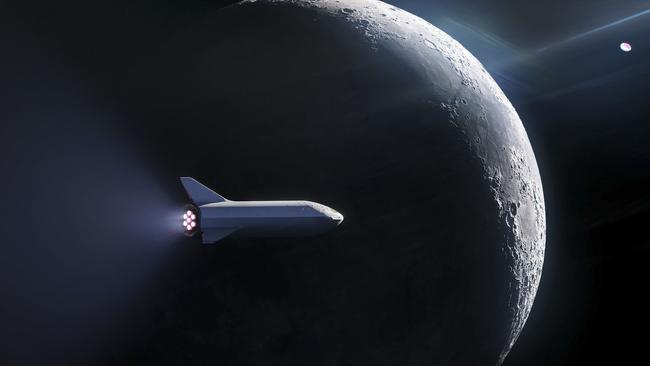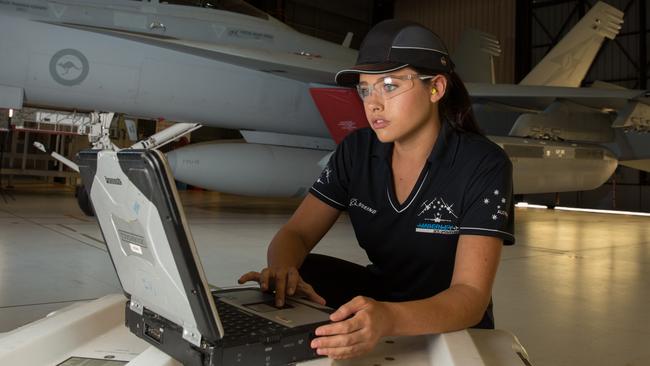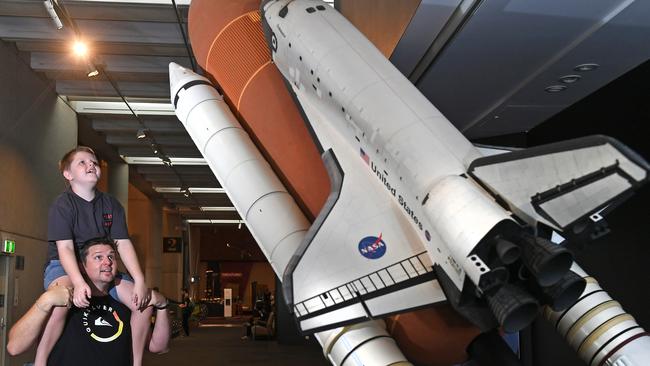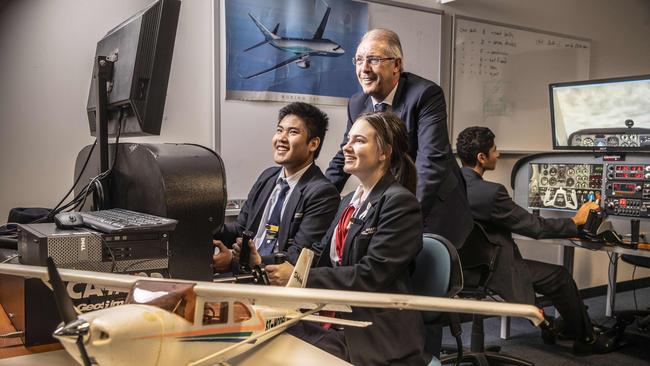Boom times coming for the aerospace industry
Looking for a career where there’s plenty of jobs and a bright future? There’s a $6 billion industry taking off in Queensland, and it needs you. Here’s how to cash in.

North
Don't miss out on the headlines from North. Followed categories will be added to My News.
Prepare now to cash in on a $6 billion Queensland industry of the future.
That’s the message in the Queensland Government’s Queensland Aerospace 10-Year Roadmap and Action Plan, which aims to turn the booming local industry into a global star by 2028.
But there is a major hurdle to overcome. There is already a “severe shortage of aviation personnel and the situation is growing worse”, a recent Federal Department of Infrastructure Report of the Expert Panel on Aviation Skills and Training found.
“The size of the challenge is enormous,” the report said.
“ … global demand for additional aviation technicians will exceed 648,000 (256,000 will be required in the Asia Pacific) and over 637,000 additional pilots will be required (253,000 will be required in the Asia Pacific).”
This represents an opportunity for students looking at their career options to consider the industry as a long-term career.
SPACE NEWS: The rockets that are changing everything
HOT DEAL: $1 FOR 28 DAYS: SUBSCRIBE TO CITY NORTH NEWS & THE COURIER MAIL
Pilots and aircraft maintenance technicians were the top priorities, according to the Aviation 2018 IRC Skills Forecast. That forecast said 70 per cent of employers in the sector reported experiencing a skills shortage in the past year, including industry qualified aerospace educators, avionic/software engineers and aerodrome reporting officers.
Boeing Defence Australia’s human resources director Trina Medley said the company, which employed more than 1000 people in Brisbane alone, needed workers.

“Boeing Defence Australia’s national workforce has almost doubled over the past 10 years and that growth is set to continue, including here in Brisbane,” Ms Medley said.
“The opportunities for anyone wanting to move into engineering and aerospace are truly limitless. From fast jet sustainment and factory automation research through to advancing autonomous aerospace systems and customer technical support, our employees work on projects that push the boundaries of imagination and excellence every day.
“We will need talented, passionate and innovative people to join our team for many years to come.”
She said Boeing employees work in development programs for the Australian Defence Force, including the Project Currawong battlespace communication system and a major upgrade program for the Wedgetail Airborne Early Warning and Control aircraft operated by the Royal Australian Air Force. About 40 per cent of their total workforce were engineers.
“We have a portfolio of work spanning almost every discipline of engineering with roles available in hardware, software, systems, electrical, electronic and aerospace, along with a number of technical, maintenance and analysis positions,” she said. “We also need skilled and creative thinkers for our support services including in HR, finance and supply chain.
“The key activities performed in Brisbane include advanced research and development; designing and developing complex, large-scale communications and aircraft mission systems; and developing unmanned and autonomous systems.”
Queensland was home to almost a third of the nation’s aerospace industry businesses, State Government figures show, with more than 300 enterprises based here.

MORE: Milestone in NASA’s race to build quiet supersonic jets
Space race to the moon hots up
A recent Deloitte report showed that the state could have a $6 billion industry by 2036. Their Sky is not the Limit: Building Queensland’s Space Economy report stated the industry comprised more than 2000 full-time positions and generated $760 million per year through core industry services like satellite communications.
A government spokesman said that in-school training, such as provided by Aviation High’s School of Excellence in Aerospace and Aviation, would help fill the skills shortage.
“A global aircraft and maintenance workforce shortfall creates a significant opportunity for Queensland,” he said.
“Our Queensland Aerospace 10-Year Roadmap and Action Plan sets out our vision and approach to skilling the aerospace sector.
“Aerospace has the potential to be one of Queensland’s boom industries, presenting plenty of job opportunities into the future.

“Programs like Gateway to Industry Schools (such as Aviation High) are available to set young people up for a fulfilling career in the sector.
“The Palaszczuk Government has allocated $155,000 towards aerospace through its $1 million-plus Gateway to Industry Schools program.
“The program was established to support the growth and development of an effective workforce for the aviation industry sector.
Any student with an interest in aerospace should take advantage of the programs in place to give them a head start in this exciting industry.”
QUEENSLAND AEROSPACE
The 10-year Roadmap and Action Plan states:
WHAT IS AEROSPACE?
“The aerospace industry comprises the wide range of entities involved with the research, design and development of flight vehicles and equipment, as well as the support of these activities. Flight vehicles include aeroplanes and rotorcraft, UAS, rockets, missiles and spacecraft such as satellites.
“Aerospace businesses provide goods and services across all aspects of the design, development, manufacture, modification, testing, operation and maintenance of all flight vehicles and their on-board and ground systems.”
WHY IS THE INDUSTRY GROWING?
Growing aircraft fleet demand
Growing defence budgets
Demand for maintenance, repair and overhaul
Regional demand for training
Global sustainability trends
WHAT’S GOING ON IN QUEENSLAND?
“Queensland has more than 31 per cent of the industry’s establishments, more than 300 enterprises
“In 2015-16, aircraft manufacturing and repair services industry sector contributed about $565 million and 4200 jobs
“Exports make up more than 45 per cent of revenue
A quarter of Australia’s growing UAV industry is located in Queensland
“Queensland has three RAAF bases, including Australia’s largest at Amberley, plus the Army Aviation Centre at Oakey.”
Research is big here:
“Queensland’s highly regarded research agencies with specialist expertise in aerospace related
research and development include:
• the Aerospace Autonomy Group within the Science and Engineering Faculty at QUT, which conducts research into subsystem analysis, design and build (including detect-and-avoid
and multi-sensor navigation), optimisation and data-driven air traffic analysis
• hypersonic flight research at UQ and University of Southern Queensland (USQ) in conjunction with the Defence Science and Technology Group — Centre for Hypersonics implementation, which investigates unsteady hypersonic aerodynamic effects in Australia’s only supersonic-to-hypersonic wind tunnel located at USQ Toowoomba
• nanotechnology and materials science research at Griffith University and the Queensland Centre for Advanced Materials Processing and Manufacturing (AMPAM) at UQ, delivering
leading-edge research on new-generation engineering materials, smart functional materials and advanced manufacturing technologies
• the recently formed Aviation Innovation Network at QUT, which was formed to bring together industry, researchers and related organisations in order to facilitate user-driven research.”


